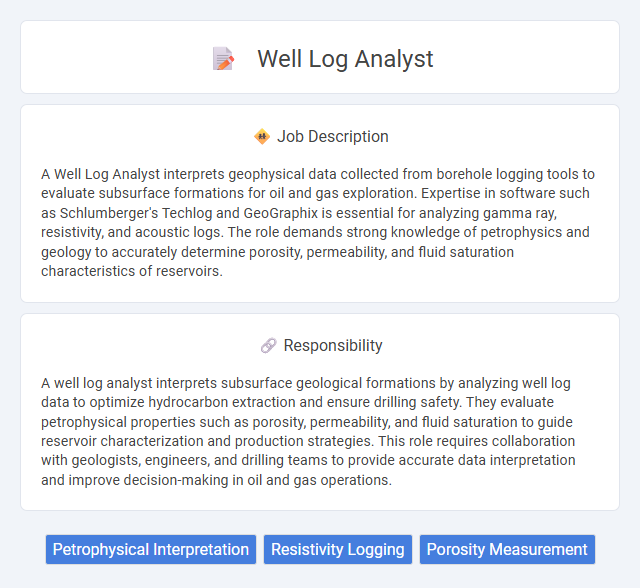
A Well Log Analyst interprets geophysical data collected from borehole logging tools to evaluate subsurface formations for oil and gas exploration. Expertise in software such as Schlumberger's Techlog and GeoGraphix is essential for analyzing gamma ray, resistivity, and acoustic logs. The role demands strong knowledge of petrophysics and geology to accurately determine porosity, permeability, and fluid saturation characteristics of reservoirs.
Individuals with strong analytical skills and a keen interest in geology and data interpretation are likely to be well-suited for a Well Log Analyst position. Those comfortable working with complex datasets and detailed technical information may find the job rewarding and engaging. Conversely, candidates who prefer less technical roles or struggle with precision and attention to detail might face challenges adapting to the demands of this profession.
Qualification
A Well Log Analyst requires a strong foundation in geosciences, petroleum engineering, or a related field, often evidenced by a bachelor's degree. Proficiency in interpreting well log data, using software such as Schlumberger Techlog or Halliburton Landmark, and understanding formation evaluation techniques is essential. Experience in data analysis, attention to detail, and knowledge of industry standards like API and SPE enhance job performance and qualification.
Responsibility
A well log analyst interprets subsurface geological formations by analyzing well log data to optimize hydrocarbon extraction and ensure drilling safety. They evaluate petrophysical properties such as porosity, permeability, and fluid saturation to guide reservoir characterization and production strategies. This role requires collaboration with geologists, engineers, and drilling teams to provide accurate data interpretation and improve decision-making in oil and gas operations.
Benefit
A Well Log Analyst position likely offers significant benefits such as career advancement opportunities in the oil and gas industry, where technical expertise is highly valued. The role may provide competitive salaries and access to advanced technology and training, enhancing professional skills. Employees could also experience job stability and potential for international assignments, increasing both income and industry exposure.
Challenge
Well log analysts probably face the significant challenge of accurately interpreting complex subsurface data to inform drilling decisions. They likely deal with varying data quality and geological inconsistencies that require advanced analytical skills and attention to detail. Balancing the need for timely analysis with precision may also present ongoing pressure in this role.
Career Advancement
A well log analyst plays a crucial role in interpreting subsurface geological data to support oil and gas exploration and production. Career advancement typically involves progressing from entry-level data interpretation to senior analyst roles, eventually leading to specialized positions such as petrophysicist or reservoir engineer. Gaining expertise in advanced logging technologies, software proficiency, and cross-disciplinary collaboration enhances opportunities for leadership roles and project management within the energy sector.
Key Terms
Petrophysical Interpretation
A Well Log Analyst specializes in petrophysical interpretation by analyzing subsurface geological formations through well log data to assess reservoir properties such as porosity, permeability, and fluid saturation. Expertise in interpreting gamma ray, resistivity, density, and neutron logs enables accurate identification of hydrocarbon-bearing zones and formation evaluation. Advanced skills in software tools like Schlumberger Techlog or Halliburton Landmark are essential for rigorous data analysis and support of exploration and production activities.
Resistivity Logging
A well log analyst specializing in resistivity logging interprets subsurface electrical resistivity data to identify hydrocarbon-bearing formations and evaluate reservoir properties. This role involves analyzing resistivity measurements from tools such as induction and laterolog logs to distinguish between water, oil, and gas zones. Proficiency in petrophysical software and understanding of geophysical principles are essential for accurate formation evaluation and well completion decisions.
Porosity Measurement
A well log analyst specializing in porosity measurement interprets subsurface geological data to estimate the pore space within reservoir rocks, crucial for evaluating hydrocarbon storage capacity. Utilizing tools such as neutron, density, and sonic logs, they quantify porosity, aiding in reservoir characterization and production forecasting. Accurate porosity analysis supports optimal drilling decisions and enhances hydrocarbon recovery strategies.
 kuljobs.com
kuljobs.com